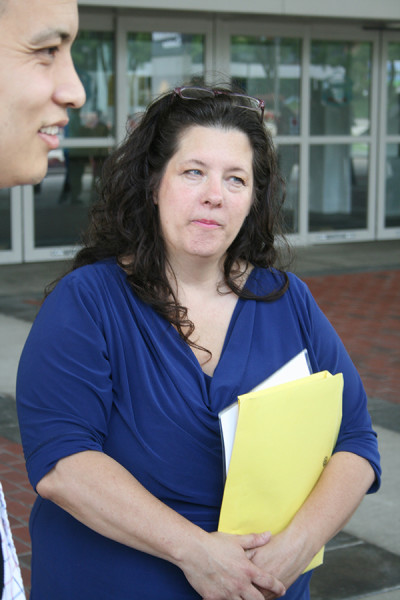A Washington-area evangelical church featured in recent reports in an alleged cover-up of child sexual abuse took center stage March 9 at a Maryland state senate hearing.
Proposed legislation considered at the hearing would extend the statute of limitations on civil lawsuits alleging child sex abuse from the current seven years after victims turn 18 to 20 years, when they turn 38.
Both the Washingtonian and Time have reported on the alleged cover-up by Covenant Life Church in Gaithersburg, Md., and Sovereign Grace Ministries.

Pam Palmer talks about Southern Baptist Convention leaders’ ties to Sovereign Grace Ministries founder C.J. Mahaney with messengers at the 2014 SBC annual meeting.
Testimony in favor of the bill included Dominic and Pam Palmer, plaintiffs in a class-action lawsuit against the church, which was thrown out of court in 2014 due to the seven-year statute of limitations for civil child sex abuse complaints.
“Our lawsuit included 11 victims of previous sex crimes, each citing evidence to show that the defendants were guilty of sex-abuse cover up,” Dominic Palmer, whose now 27-year-old daughter was allegedly molested at age 3, testified before the Senate Judicial Proceedings Committee.
“Guess what happened?” he asked senators. “All the evidence of our lawsuit was dismissed, not because it didn’t have merit. It was turned down because the statute of limitations had run out.”
Pam Palmer, who testified in support of similar legislation that didn’t make it to the floor last year, said Maryland should follow the example of neighboring states that have passed laws allowing victims to seek justice that would have been denied under older statutes of limitation.
“When there is pervasive collusion by an institution, victims deserve to have freedom to bring civil litigation through extended statutes of limitation,” she said. “This stop predators, and it brings about greater safety for the society at large.”
Last year most of the witnesses speaking against the measure spoke about its potential negative impact on the Roman Catholic Church. This year, except for a passing mention to the movie Spotlight by the bill’s sponsor, arguments to leave the statute of limitation where it is centered on the scandal surrounding Covenant Life Church.
Charlotte Ennis, a member of Covenant Life Church who is married to former Sovereign Grace Ministries Executive Director Pat Ennis, said even though she personally is a survivor of childhood sexual abuse, she opposes the Maryland law.
“This bill lacks sufficient language to protect those who may be falsely accused years in the future,” Ennis said. “I do not see any difference in the anguish, long-term ill effects, or personal devastation experienced by those abused or those falsely accused. I know victims of both. Both have their lives grotesquely ripped apart.”
Ennis described the lawsuit against her church as an “egregious, and even bizarre” $50 million lawsuit “that was undoubtedly false.”
Terry Mayo, another member of Covenant Life Church, said an independent investigator hired by the church determined that allegations in the lawsuit accusing her husband of abuse probably never happened but resulted from what the accuser wrongly believed was the recovery of a suppressed memory.
“But that didn’t spare us from a witch hunt,” Mayo said. “In the initial months, the accused were labeled child sex offenders, and the story of the abuse, truth be damned, was aggressively promoted in news, radio and social media. We received online threats that flyers would go out to our neighbors informing them of the pedophile at our address. Anonymous calls were made to business clients threatening them for doing business with us. Online forums ripped us to shreds.”
Mayo asked senators to think about how they would defend themselves against being falsely accused of something 25 or 30 years ago.
“Defending yourself from a false accusation 25 years ago is a terrifying position to be in,” she said. “An Internet lynch mob can go on forever but the law should protect people from legal charges they can’t defend, like those from the distant past.”
The bill’s sponsor, Sen. Ronald Young (D- Frederick County), said many children who are sexually abused don’t come to terms with what happened to them until well after the current seven-year statute of limitations.
“Many people abused sexually as children don’t deal with it themselves until they’re in their 30s or even late 30s,” he said. While even the 20-year deadline would leave out adults who don’t deal with their abuse until later in life, Young said it is better than the current law.
“I think we’re being easier on the abuser than the ones that are being abused,” the senator said.
The plaintiffs in the dismissed lawsuit knew that the alleged abuse took place outside the statute of limitations but argued unsuccessfully they had no reason to suspect that church leaders colluded to keep it quiet until they started encountering each other’s stories on the Internet.
Susan Burke, the attorney who represented the Maryland group, has said she plans to file another lawsuit in Virginia over abuse alleged in another court’s jurisdiction.
